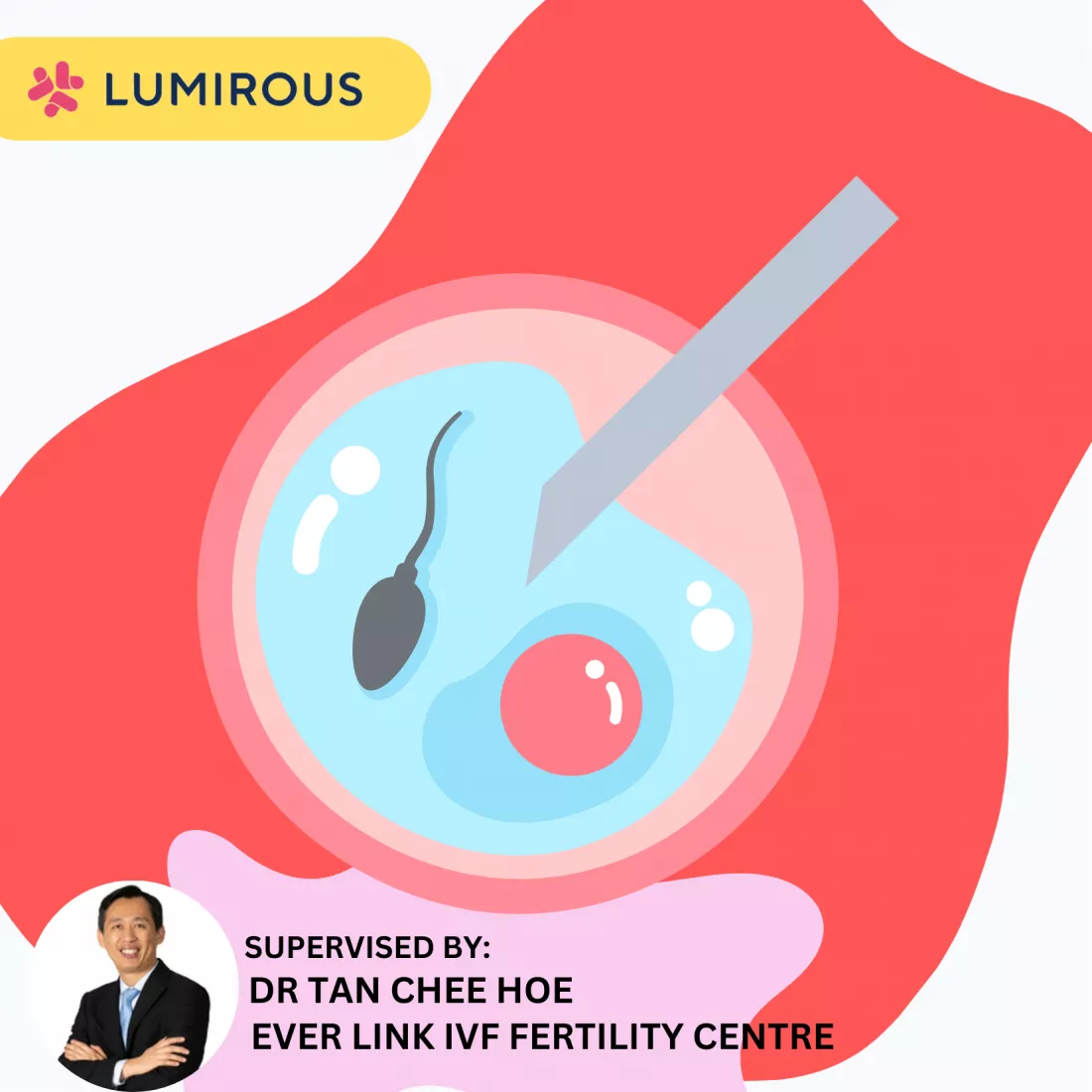Table of Contents
- What is ICSI?
- How Much Does ICSI Cost in Malaysia?
- What is The ICSI Treatment Success Rate?
- Who is Suitable To Undergo ICSI Treatment?
- Step-by-Step Process of ICSI
- When Will Your Menstrual Period Start After The Egg(s) Retrieval Procedure?
- What Are The Medications Used in ICSI?
- What to Prepare For Before ICSI?
- Can You Have Sexual Intercourse After ICSI?
- Can You Have Sexual Intercourse After Getting Pregnant?
- What Alarm Signs To Look Out For After ICSI Treatment?
What is ICSI?

Intracytoplasmic sperm injection (ICSI) is a fertilization technique that directly injects a single healthy sperm into the mature egg to increase the chance of successful fertilization under laboratory conditions.
ICSI procedure is usually done as part of IVF treatment, especially for underlying severe male factors.
Compared with Conventional IVF, the egg is placed in the petri dish (50,000 sperms to 1 egg ratio ), allowing the sperms to fertilize the egg naturally.
How Much Does ICSI Cost in Malaysia?
ICSI is included in most IVF packages in Malaysia.
The cheaper package may not include ICSI and therefore requires add-on service, costing up to RM 5,000 – RM 8,000.
What Is The ICSI Treatment Success Rate?
Meanwhile, the pregnancy rate is similar to Conventional IVF treatment, which is between 19% to 32% for each cycle, depending on the patient profile. However, the success rate is higher with the application of Preimplantation Genetic Testing.
The main causes of ICSI failure are
- The egg did not survive after injection.
- The eggs did not activate or were damaged; hence the egg failed to fertilize.
- Abnormal Sperm Function cause fertilization failure
- Fertilized eggs fail to form an embryo
- The embryo stops growing
Who is suitable to undergo ICSI treatment?
ICSI is the main treatment for men with severe infertility problems that impair their ability to produce good-quality sperm, especially for cases of low sperm count and sperm with motility or morphology issues.
This treatment is also suitable for men who have to get their sperm extracted surgically or have a low-quality frozen sperm sample.
Likewise, couples who have had several unsuccessful IVF cycles will be recommended for ICSI as the next option. Some fertility centers routinely apply ICSI during IVF treatment, as part of their IVF program.
Step-by-Step Process of ICSI
ICSI is a laboratory procedure after an egg retrieval procedure and after obtaining the semen sample from a male partner (during routine IVF treatment).
The embryologist recruits a healthy-looking sperm, after that, injects the sperm directly into the egg under microscope guidance.
STEP 1 : Ovulation
STEP 2 : Eggs Retrieval
STEP 3 : Sperm Retrieval
A patient undergoing ICSI may have the sperm sample collected through surgery or masturbation. The sperm sample will be washed and screened to select one with the best quality.
STEP 4 : Fertilization using the ICSI technique
A single sperm will be directly injected into the mature egg for fertilization. This will be done clinically in the laboratory by the embryologist.
STEP 5 : Uterus Implantation
The embryo will be transferred into the uterus for implantation.
When Will Your Menstrual Period Start After The Egg(s) Retrieval Procedure?
Your menstrual cycle should resume after 10 to 14 days after the egg collection procedure if you are planning for Frozen Embryo Transfer.
If fresh embryo transfer is carried out after the egg picks up. Menstruation usually indicates implantation failure and you are not pregnant.
What Are The Medications Used in ICSI?
The ICSI procedure itself won’t require the patients to be administered any medications as it is a laboratory procedure done by the embryologist.
What To Prepare For Before ICSI?
Couples are advised to seek fertility screening, to identify the possible cause of infertility. Thereafter, the treatment plan can be customized according to the needs.
Men with severe infertility would be advised to make changes in their lifestyles such as keeping to a healthy diet, regular exercise, abstaining from smoking, drinking, and using illicit drugs. Your doctor may also prescribe supplements and daily vitamins that may help boost sperm production.
Similar to IVF, ICSI has the possibility of having more than one embryo fertilized. Multiple pregnancies (twins, triplets, or more) increase the risk of complications during the pregnancy. Discuss with your partner and consult your doctor for the best way to move forward.
What Are Things You Can Do And Avoid After ICSI Treatment?
The ICSI procedure itself will not make any difference for the couple’s general health as it is a laboratory procedure. You may resume your daily life as usual.
Can You Have Sexual Intercourse After ICSI?
The answer is yes, but if you have reached the embryo transfer stage in IVF treatment, you will be advised to abstain from sexual intercourse for two weeks.
Can you have sexual intercourse after getting pregnant?
You should avoid performing heavy exercise or high-impact activities after the egg retrieval procedure. You will be advised to abstain from sexual intercourse for two weeks.
What Alarm Signs To Look Out For After ICSI Treatment?
Nothing is expected to happen to you during ICSI as this procedure happens outside of a woman’s body.
However, after embryo transfer, the risk is similar to those for IVF treatment. Pay attention to symptoms of sharp, stabbing pain in your lower body, vaginal spotting or bleeding or dizziness and feeling faint. One or combinations of these symptoms have the possibility of infections, ovarian hyperstimulation syndrome (OHSS) or ectopic pregnancy. Immediately contact your doctor.
